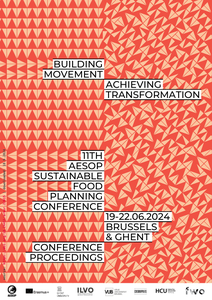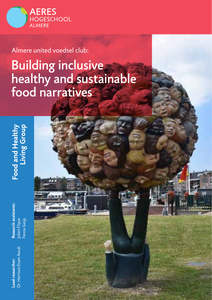Tijdens de HAS Food Experience 2021 voert Marjo Baeten gesprekken over het ontwerpen van duurzame voedselsystemen. In gesprek met de gasten komt aan bod wat hun visie op de uitdagingen in food vandaag de dag is én welke impactvolle, creatieve en ondernemende oplossingen er zijn bedacht zijn.
LINK
More and more people worldwide live in urban areas, and these areas face many problems, of which a sustainable food provision is one. In this paper we aim to show that a transition towards more sustainable, regionally organized food systems strongly contributes to green, livable cities. The article describes a case study in the Dutch region of Arnhem–Nijmegen. Partners of a network on sustainable food in this region were interviewed on how they expect the food system to develop, and in design studies possible futures are explored. Both the interviews and the designs give support to the idea that indeed sustainable food systems can be developed to contribute to green livable cities. They show that the quality and meaning of existing green areas can be raised; new areas can be added to a public green system, and connections with green surroundings are enforced. They also show that inhabitants or consumers can be stimulated to become so called food citizens, highlighting that the relation of food systems and livable cities is a very close one.
DOCUMENT

The transition towards a sustainable and healthy food system is one of the major sustainability challenges of today, next to the energy transition and the transition from a linear to circular economy. This paper provides a timely and evidence-based contribution to better understand the complex processes of institutional change and transformative social-ecological innovation that takes place in the food transition, through a case study of an open innovation and food transition network in The Netherlands, the South-Holland Food Family (Zuid-Hollandse Voedselfamilie). This network is supported by the provincial government and many partners, with the ambition to realize more sustainable agricultural and food chains, offering healthy, sustainable and affordable food for everyone in the Province of South-Holland in five to ten years from now. This ambition cannot be achieved through optimising the current food system. A transition is needed – a fundamental change of the food system’s structure, culture and practice. The Province has adopted a transition approach in its 2016 Innovation Agenda for Sustainable Agriculture. This paper provides an institutional analysis of how the transition approach has been established and developed in practice. Our main research question is what interventions and actions have shaped the transition approach and how does the dynamic interplay between actors and institutional structures influence institutional change, by analysing a series of closely related action situations and their context, looking at 'structure' and 'agency', and at the output-outcomes-impact of these action situations. For this purpose, we use the Transformative Social-Ecological Innovation (TSEI)-framework to study the dynamic interplay between actors and institutional structures influencing institutional change. The example of TSEI-framework application in this paper shows when and how local agents change the institutional context itself, which provides relevant insights on institutional work and the mutually constitutive nature of structure and agency. Above institutional analysis also shows the pivotal role of a number of actors, such as network facilitators and provincial minister, and their capability and skills to combine formal and informal institutional environments and logics and mobilize resources, thereby legitimizing and supporting the change effort. The results are indicative of the importance of institutional structures as both facilitating (i.e., the province’s policies) and limiting (e.g. land ownership) transition dynamics.
DOCUMENT

Citizens living in food poverty can easily get caught up in a vicious cycle. Socio-economically disadvantaged people often rely on food assistance and are more likely to suffer from diseases caused by unhealthy diets, such as diabetes. They may also experience isolation and lack social networks, as they do not have the financial means to participate in social life. Moreover, this group is often overlooked in decision-making processes regarding healthy and sustainable food environments. To create equitable food environments in urban areas, it is crucial to incorporate the everyday challenges and needs of socioeconomically disadvantaged people. In our collaborative research, we explore the needs of socioeconomically disadvantaged people regarding a healthy and sustainable diet in Switzerland and the Netherlands. The aim is also to develop, in a participatory way, ideas on how to create more socially just and inclusive food environments.Keywords: food poverty, food environments, social participation, participatory action research
DOCUMENT

The aim was to study the needs, opportunities and effects of citizen engagement in the urban food system transition. This addresses the issue of - ‘how’, ‘in what ways’ and ‘through what methods’ - citizens can be engaged in the developments towards a more sustainable and healthy regional food system. The research project sought to investigate the roles citizen engagement can take in the transformation of the urban food environment towards healthier and sustainable food consumption patterns. The study covers desired food futures; food discourse; the message our bodies convey about our eating habits; the effect of Covid-19 on food pattern transformations; the term 'organic' in relation to food; mass media as a source of information about food.
DOCUMENT

With the increasing global population, urbanization, the current unsustainable and expansive agricultural practices would be expected to further elevate the risk of food and nutritional insecurity of the global population, which is recognized as a global threat for the 21st century. This paper reviews the demographic changes, urbanization, sustainability of the conventional agricultural systems, the environmental and resource implications and presents possible sustainable alternatives.
DOCUMENT

The growing appetite of cities is one of the greatest future challenges. There is no set menu for meeting this appetite, but a trend is observed in which city authorities focus on region-based food provision. Regionalism is motivated by the importance of increased self-reliance. Besides, regional food systems, are associated with more sustainable production and reduced carbon footprints, the reconnection of consumers with production, and the increased uptake of whole foods in urban diets. However, the question remains to what extend region based food systems may become self-reliant? How may they contribute to improved sustainability and healthy lifestyles? With the Dutch city of Almere as a case in point this paper provides a food flow data-based analysis of the opportunities and limitations of regional based food system approaches. The paper sets off with defining the concepts of sustainable self-reliance and regionalism. Next, it describes the methodology of measuring and mapping the actual food flows. We combined secondary, publicly available, with primary quantitative and qualitative datasets, involving regional businesses, urban policymakers, and residents. Our study uncovers the coinciding disconnect and interconnectedness of local, regional and global food systems. The regional scale offers opportunities for tackling many food related challenges, however, sustainable urban food security demands connections beyond the regional sphere and beyond the food domain. To assess the effects of the policy options available at the local and regional level, a solid evidence base is essential. This paper advances the development of evidence-based methodologies to monitor and inform food system policies.
DOCUMENT
This study proposes a systematic value chain approach to helping businesses identify and eliminate inefficiencies. The authors have developed a robust framework, which food-sector entrepreneurs can use to increase profitability of an existing business or to create new profitable opportunities. The value chain approach provides win-win opportunities for players within the value chain. To test the robustness of the framework, the authors use food waste as an example of a critical inefficiency and apply it to two different food sector business cases, each operating in diverse conditions. Because the suggested framework addresses the core elements and parameters for the existence and competitiveness of a business, the model can be adapted to other sectors.
DOCUMENT

From the article: "This article evaluates the application of blockchain technology to improve organic or fair-trade food traceability from “Farm to Fork” in light of European regulations. This study aims to shed light on the challenges in the organic food chain to overcome, the drivers for blockchain technology, and the challenges in current projects."
DOCUMENT

Moral food lab: Transforming the food system with crowd-sourced ethics
LINK